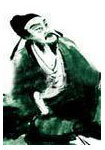《四祖寺》 赵嘏
自为心猿不调伏,祖师元是世间人。
作者简介(赵嘏)

赵嘏 , 字承佑, 楚州山阳(今江苏省淮安市楚州区)人, 约生于宪宗元和元年(806). 年轻时四处游历, 大和七年预省试进士下第, 留寓长安多年, 出入豪门以干功名, 其间似曾远去岭表当了几年幕府。 后回江东, 家于润州(今镇江). 会昌四年进士及第, 一年后东归。 会昌末或大中初复往长安, 入仕为渭南尉。 约宣宗大中六、七年(852、853)卒于任上。 存诗二百多首, 其中七律、七绝最多且较出色。
《四祖寺》赵嘏 翻译、赏析和诗意
四祖寺诗词赏析:
《四祖寺》是唐代诗人赵嘏创作的一首诗词。这首诗通过描绘四祖寺的景色,抒发了作者对自身困境的思考和对佛教教义的理解。
诗中描述了四祖寺松树丛生,双峰耸立的景色。这里的"松下双峰寺"一句,既是景物描写,又融入了佛教的思想,暗示着佛教教义的高洁和庄严。
接下来,诗人提到自己身处其中的景色,却只有一盏灯的光亮。这句"一盏灯前万里身"把诗人的身份置于寂静与孤独的环境中,并融入了禅宗思想中的修行与证悟的意味。灯光的微弱与无尽的身影,给人以一种寂寞、迷茫和思考的感觉。
接着,诗人表明了自己内心的无法驾驭和追随的状态,称其心灵为"心猿"。"自为心猿不调伏"这句,表达了诗人对自己内心波动、难以驾驭的困惑和痛苦。同时,也折射出作者对自己修行状态不佳的反思。
最后,诗人提到四祖是实在的存在,指明了佛教的祖师在世间是真实存在的人。这句"祖师元是世间人"既是对佛教教义的肯定,也是对佛教修行者的鼓励和警示。
整首诗以景物的描写和个人的内心状况相结合,通过抒发自己内心的疑问与不安,表达了对佛教教义的追求与思考,体现了唐代佛教文化的主题和特点。
中文译文:
四祖寺
千株松下双峰寺,
一盏灯前万里身。
自为心猿不调伏,
祖师元是世间人。
Poem Translation:
Temple of the Fourth Patriarch
Beneath a thousand pine trees rests the temple,
Before a single lamp, my body stretches for a thousand miles.
Unable to conquer my monkey mind,
The patriarch, fundamentally, is but an ordinary person.
Appreciation:
"Temple of the Fourth Patriarch" is a poem written by Tang Dynasty poet Zhao Gu. This poem depicts the scenery of the temple and expresses the poet's contemplation on his own dilemma and understanding of Buddhism.
The poem describes the temple with its dense pine trees and towering twin peaks. The phrase "Beneath a thousand pine trees rests the temple" not only describes the scenery but also implies the purity and solemnity of Buddhist teachings.
Next, the poet mentions his own presence in this scenery, lit only by a single lamp. The line "Before a single lamp, my body stretches for a thousand miles" places the poet's identity in a silent and lonely environment, incorporating the meaning of practice and enlightenment in Zen Buddhism. The dim light and endless shadows create a sense of loneliness, confusion, and contemplation.
Furthermore, the poet reveals his inability to control and follow his own mind, describing it as a "monkey mind." The line "Unable to conquer my monkey mind" expresses the poet's confusion and pain over the fluctuations and uncontrollable nature of his inner self. At the same time, it reflects the author's reflection on his unsatisfactory state of practice.
Finally, the poet mentions that the Fourth Patriarch is a genuine person in the world, affirming the truth of Buddhist teachings. The line "The patriarch, fundamentally, is but an ordinary person" serves as both an affirmation of Buddhist teachings and encouragement and warning for Buddhist practitioners.
The poem combines the description of the scenery with the poet's inner state, expressing his pursuit and contemplation of Buddhist teachings. It reflects the themes and characteristics of Buddhist culture during the Tang Dynasty.
《四祖寺》赵嘏 拼音读音参考
sì zǔ sì
四祖寺
qiān zhū sōng xià shuāng fēng sì, yī zhǎn dēng qián wàn lǐ shēn.
千株松下双峰寺,一盏灯前万里身。
zì wèi xīn yuán bù tiáo fú, zǔ shī yuán shì shì jiān rén.
自为心猿不调伏,祖师元是世间人。